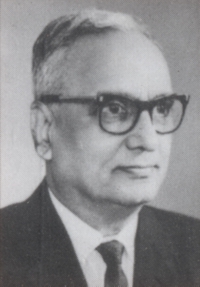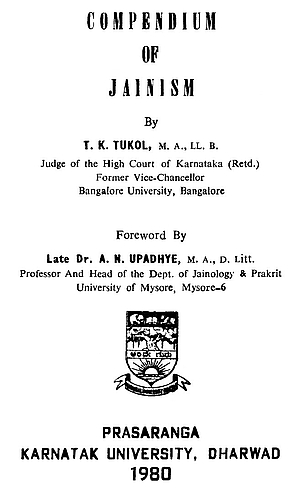"........Virtue is an activity, and lieth not
in doctrine and theory but in practice and conduct,
co-ordinating potencies into energy,
....................................................
the preferential imitation of right action
is THE HABIT OF VIRTUE;..........................
The Testament of Beauty
by Robert Bridges,
Book IV, Lines 623-28.
There is no dearth of religions and philosophical doctrines in the world. What the world needs today is the sincere practice of those doctrines in daily life. In the hands of the priesthood, every religion becomes a ritual; with the ignorant, it becomes a mass of superstitious beliefs; it thus loses its scientific foundation.
The Jaina thinkers have taken care to see that religion becomes a way of life with a clear stream of reason to sustain it. In order that one should not lose sight of the ten supreme virtues in daily life, tradition has prescribed a festive called "Daśalakṣaṣa-parva" to be observed for ten days devoting a day for the contemplation of one virtue. The Digambaras observe the festival from the fifth day of the lunar half of the month of Bhadrapada, The Śvētāmbaras observe it as Paryūṣaṇa-parva from the full moon day of the month of Āṣāḍha. The days are spent in fasting, contemplation and study of the scriptures, particularly the Tattvārtha Sutra. The object is to purify the mind and exert for the subsidence of the Karmas.
A brief reference has already been made to these virtues while discussing the topic of stoppage and shedding of Karmas. These ten virtues have been enumerated in Sutra 6 of Chapter IX of the Tattvārtha Sutra as follows:
"Uttamakṣamāmārdavārjavasatyaśaucasaṁyamatapastyāgākiñcanyabrahmacaryāṇi dharmaḥ."
Supreme forbearance, humility, straightforwardness, truthfulness, purity, self-control, austerity, renunciation, non-attachment and celibacy constitute the religion or duty. These ten virtues are intended to regulate the activities of mind, thought and action. Their practice or observance gives direction to the life of a votary by eliminating all his evil thoughts and preventing him from harmful actions. The word uttama or supreme ought to be read along with each of the virtues implying thereby that the practice should be of the highest order or in full measure. There should be no expectation of any earthly reward except that of attaining purity and spiritual advancement. It is appropriate to discuss them-in the order in which they are enumerated above.
1) Uttama Kṣamā or Supreme Forbearance.
Supreme forbearance or forgiveness is a divine virtue. There are numerous occasions in life when the peace of mind is disturbed by anger due to the conduct of other people or by force of circumstances resulting in ill-treatment or insults. Each individual has his own weaknesses* at times, one is provoked to injure the feelings of others or be injured by others. Wisdom consists m maintaining peace of mind without getting mentally disturbed; this is called forbearance. For an ascetic, there might be situations when he is abused; insulted or rebuked by people who are opposed to his way of life or nudity. He must bear everything calmly and think with himself that all such display of temper is due to ignorance of the importance of the codes of saintly life and that he should forgive all those who might be prone to cause him mental or physical pain.
Bhagavān Mahavira was once questioned by his disciple: "Sire, what does the soul get by practice of forgiveness?'' He replied: 'By forgiveness, the mind gets peace and kindness of disposition; kind disposition, creates affection towards all living creatures; by an affectionate disposition the mind becomes pure; by purity, it beomes tearless."
Anger is the chief enemy of self-happiness, self-restraint and detachment are all the qualities of the soul. Anger destroys all these qualities and degenerates the quality of the soul. Anger puts the mind out of gear and one does not know what a person who loses his balance of mind will do in a moment of heat. Most of the misdeeds and criminal actions are committed when persons are overcome by anger. Anger dries up the very springs of humanism. A person in anger might act like a beast and thus lose all the best qualities of the mind and the heart.
Angry words are the expressions of a perverted mind; such words cause pain to others and entangle their author into sins. They can be controlled by patience which is the outcome of wisdom and forbearance.
Kṣamā is another word in Sanskrit for the earth; she patiently bears all the inroads that are committed by people; she offers fruits and protection to all living beings. Anger begets hatred; hatred begets enmity; enmity is the cause of sustained misery to all parties concerned. Patience and forbearance can be acquired by observance of the vow of Ahimsa. Forgiveness is a divine quality. When Jesus Christ was crucified, he said "Forgive them, Father, they know not what they are doing." Mahatma Gandh breathed a word of forgiveness towards his assassin before his death. Thus forgiveness begets love and brings peace of mind. It stops the influx of new Karmas and helps to purge off the old ones. Peace and happiness are the most enviable possessions of man; they are lost by anger but regained by forgiveness.
Forgiveness is the most powerful armour of man. The law of Karma lays down: reap as you sow. Anger and violence are the chief causes of war and unhappiness. Man can regain peace and happiness by non-violence and forgiveness. They are the manifestations of the true Self and therefore their practice in life is the highest religion. He who endures, forbears and forgives knows his religion and remains free from sin; for, he has learnt the greatest lesson in righteousness.
2) Uttama Mārdava or Supreme Humility.Mārdava or softness means humility in word and deed; it brings in freedom from self-conceit and makes man kind in his heart and meek in his disposition. Modesty is born of true education and culture. Pride or self-conceit is the greatest enemy of true knowledge, faith and understanding.
Pride or self-conceit is of eight kinds: pride of one's own caste, pride of the family in which one is born, pride of personal physical beauty, pride of learning which one might have, acquired, pride of the extent of wealth possessed by oneself, pride of scriptural knowledge one might have acquired, pride of worldly gains and pride of one's strength of body. Any one of these is sufficient to pervert a man's outlook on life; it may breed rudeness and bad temper. A proud man normally becomes intolerant and blind to what is good in others. When a man becomes intoxicated with any of these causes of pride, he might indulge in self-adulation and belittle others. He might demean them and, invite anger and hatred. A self-conceited person involves himself into fruitless disputes and makes enemies of others due to his harshness of speech and conduct.
Humility is the source of compassion while conceit dries it up.. Humility in man or woman shines like a diamond in any company. While it enhances reverence towards the great sages, saints and wise men* it begets admiration and respect in other people. It destroys all misconceptions and wrong knowledge while creating a thirst for acquisition of right knowledge and conduct. The mind becomes free from prejudices and dislikes and gains in purity of thought and action. It adds dignity to one's personality and enhances one's prestige.
Everything that spoils the purity of mind and thought is the result of bad Karma. So is pride. Therefore all efforts should be made to overcome that weakness and stop further sinning by proper self-evaluation. Humility is only one aspect of Right Faith; it is dawn of Right Knowledge which infuses the true values of life. A person with such knowledge would regard all objects as passing phases of worldly existence and would realise that there is no reason for being proud of any of them. None of them can conduce to his spiritual well-being or advancement. He would discard them as wasteful objects of material life retarding the progress of the soul. One should constantly endeavour to be free from all conceits and acquire such faith and knowledge as will bring about subsidence of accumulated Karmas.
3) Uttama Ārjava or Supreme straightforwardness
Uprightness in conduct is the hall mark of every good person. Every good man is consistent in his thoughts, words and deeds while the reverse is the case with a bad person. Consistency is a virtue and inconsistency is a vice. It is only a person of. veracity that can practise true religion because religion requires him to be honest with himself and with others, To be straight-forward is to be free from cunning, duplicity, ambiguity and evasiveness in thoughts, words and deeds. "By simplicity he will become upright, in actions, thoughts and speech and he will become veracious; and thereby he will practise the law" says Bhagavān Mahavira.
Straightforwardness in dealings is the key to success in worldly life. It evokes confidence and trust in others, It conduces.; to clarity of intellect and purity of thought. It leads to honesty, of purpose of thought and action. The mind of such a person will always be peaceful. He would not have any occasion for anger which is root cause of physical and mental ailments.
 Justice T.K. Tukol
Justice T.K. Tukol
